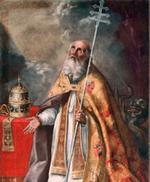Catholic World News News Feature
Cuthbert's Choice October 10, 2001
By Diogenes
Cuthbert Tunstall might have been famous--as famous as St. Thomas More. Indeed he might have been St. Cuthbert. But he made a different choice.
Like Thomas More, Cuthbert Tunstall was on intimate terms with King Henry VIII. He was not only the Bishop of London, but also the Lord Privy Seal. Again, like Thomas More, he resisted the king's divorce and paid a price for that resistance; he was exiled to the Durham diocese. But unlike Thomas More, Cuthbert Tunstall decided to cut his losses.
The moment of truth came during the controversy over the Oath of Supremacy when Cuthbert was summoned for a chat with his sovereign. King Henry's message went something like this:
Cuthbert, if you oppose me, I will have your head chopped off. I did it to Thomas More, and I did it to John Fisher. Don't make me do it to you.
(It’s possible, I suppose, that the king put that message in more diplomatic terms. But while Henry VIII had many faults, a tendency toward circumlocution was not one of them. He might have been even more direct.)
Cuthbert Tunstall found that argument compelling. He decided not to oppose the king, and he lived to a ripe old age.
As it happens, this story has a happier ending. Later in life Bishop Tunstall regained his courage, and he did dare to oppose Queen Elizabeth I. He might well have become a martyr on the second go-round, but he died of natural causes before Elizabeth caught up with him.
HENRY'S SUBTLER HEIRS
No one has ever threatened to chop off my head. Still, I have no doubt whatsoever that the threat would command my complete attention--especially if it were delivered by someone with the impeccable credibility in such matters that Henry VIII had established. So while I do not approve of the decision Cuthbert Tunstall made after his little tête-á-tête with King Henry, I certainly understand it.
What I do not understand is the comparative ease with which American political leaders today convince Catholic bishops to mute their public criticism of immoral public policies. Many years have passed since a British bishop faced an executioner, and the American hierarchy has never had to cope with that sort of unpleasantness. Yet our shepherds knuckle under to political pressure with an alacrity that would make the young Cuthbert Tunstall blush.
Every now and then one brave bishop takes a stand. And--note this carefully--he lives to tell about it. When Bishop Fabian Bruskewitz announced the excommunication of various Catholics who were involved with anti-Catholic causes, there were yelps of outrage. But the noise subsided. The bishop's head is still attached to his shoulders. He is not imprisoned. His diocese is thriving.
Now let me offer another example. Recently that indispensable newspaper, the Wanderer, ran a headline story about a statement released by New York's Archbishop Edward Egan condemning the federal government's decision to approve marketing of the "abortion pill" RU-486. The archbishop's statement was a powerful one; he condemned the drug, and its promoters, in no uncertain terms.
But then, further down the same front page, the Wanderer carried another story about the Al Smith dinner, which is held annually to raise funds for Catholic charities in the New York archdiocese. In this election year, Archbishop Egan was playing host to Vice President Al Gore. That's the same Al Gore whose administration paved the way for the legal sale of RU-486--the same Al Gore who, in a speech to abortion providers on the anniversary of the Roe v. Wade decision, had issued a thinly veiled attack on the Catholic Church. Also on the guest list for the Al Smith dinner were Hillary Clinton and Rep. Rick Lazio, both candidates for New York's seat in the US Senate, and both dedicated supporters of legalized abortion.
(To be fair, I should mention that George W. Bush, Gore's Republican rival, was also on the guest list for the Archbishop's gala. But for reasons I cannot begin to comprehend, Pat Buchanan, a practicing Catholic and pro-life advocate who had won the Reform Party's presidential nomination, was not invited.)
Yes, I know that the Al Smith dinner is a non-partisan affair. But you can be quite sure that Al Gore and Hillary Clinton and Rick Lazio expected to gain some political advantage from the event, otherwise they would not have attended. Now tell me: What would have happened if Archbishop Egan had denied them that opportunity? What dire consequences might have followed if he had refused to allow pro-abortion politicians to attend the dinner?
Oh, yes; there would have been an uproar--for a while. There would have been a stinging editorial rebuke in the New York Times. But what more would have happened? What more could have happened?
When Archbishop Egan made that admirable statement about RU-486 and the culture of death, the New York media generally ignored him. But when he greeted Gore and Clinton and Lazio at the Al Smith dinner, the cameras were clicking furiously; the pro-abortion politicians had their "photo op" with the Catholic prelate. And cynical politicians had yet another bit of reassurance that while Catholic leaders may be adamant in their rhetorical opposition to legal abortion, they--like Cuthbert Tunstall--aren't going to lose their heads.






